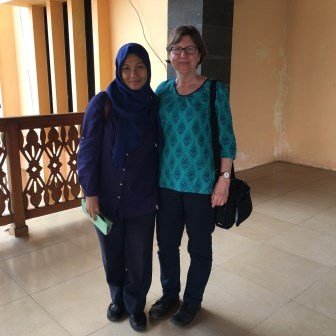Debby Cote is the Program Manager for Asia at the Canadian Red Cross. She has recently returned from a lessons learned workshop in Southeast Asia, where the Canadian Red Cross with the International Federation of Red Cross and Red Crescent Societies has been implementing the regional resilience initiative with support from the Government of Canada. Debby took a moment to answer some questions about the project for us.
Red Cross Talks: Can you tell us what the regional resilience initiative is?
 Debby:
Debby: It’s a four-year project that supports eleven Red Cross and Red Crescent Societies in Southeast Asia with the goal of reducing the impact of natural disasters on vulnerable communities.
The project looks to build the skills and capacities of local Red Cross and Red Crescent Societies so they can advocate more strongly at the national and regional levels for the needs of communities in
disaster risk reduction.
It also includes strengthening partnerships locally and regionally, both within Red Cross Red Crescent networks and with key partners such as the Association of South East Asian Nations (ASEAN) Secretariat.
Red Cross Talks: What’s the end goal of the project?
Debby: The end goal officially is to build the resilience of communities, particularly the most vulnerable communities where we work in Southeast Asia. This is being done through a few avenues, such as disaster law, gender as an integrated approach through many of the activities we do, and then building better collaboration through the regional bodies that are involved in humanitarian action and response to disasters.
Red Cross Talks: Do you have some examples you could speak to on the impact of the project on some vulnerable communities?
Debby: A really great example is when we used the
minimum standard commitments to gender and diversity in emergency programming with the distribution of relief goods after a flood in Lao People's Democratic Republic.
That was an “aha” moment for the communities where they said now that we’ve used those minimum standards, the distribution is being done with a deeper understanding of the different needs of women, girls, boys, elderly, etc. than it had been done in the past, so it’s a good example of how these tools work.
Red Cross Talks: Speaking about the tools, what are some of the tools that are being brought to this project?
Debby: A very important contribution of this project is the strengthening of the
online resilience library. It’s a virtual online library organized by sector, it has an excellent search engine so you can go in and type what you want to learn more about, it pops up and you have a whole series of resources.
Within that library is a mechanism for National Societies to share their own tools that they’ve developed and they can share their stories and case studies.
The project also supports translation into local languages, which allows even further outreach.
Red Cross Talks: From your perspective what’s the biggest success of the project?
Debby: If we start when the project was being designed, we were very cautious on what we could commit to, on what would be possible. With ASEAN for example, we were very careful about saying that we would be able to negotiate agreements, and now we’ve got a letter of agreement and a memorandum of understanding signed for working together, something very concrete.
Also, we weren’t sure we could commit to having a formalized gender network by introducing these concepts, but now we have a very strong gender network that people want to broaden. We have a gender and diversity focal point for each of the National Societies within Southeast Asia to champion within their National Societies and also bring their experiences to the broader network and then build out from that.
It’s recognized now as an effective network that people from the outside are saying we should open up and expand upon and add new members from other regional organizations. There’s a whole vibrancy of partnerships and relationships that have been spurned by having the additional resources that can be committed to some of these areas, and that’s very exciting.